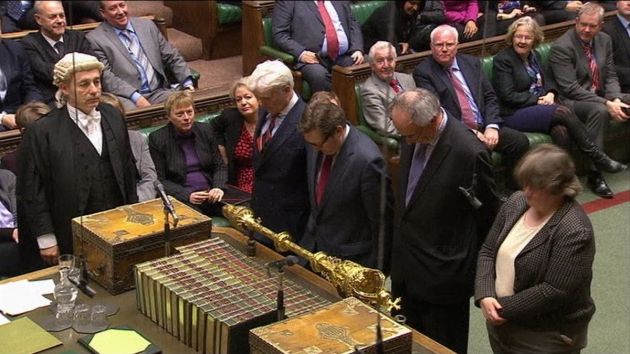Some lawmakers demand prayers in UK parliament be scrapped

Some lawmakers in the United Kingdom have demanded that prayers in Parliament be scrapped, saying the tradition has no place in the 21st century.
The government is facing calls to abolish prayers at the start of the day in what is described as part of a drive to modernize the UK Parliament, the Daily Mirror reported.
The tradition - which dates back to the 16th century - has been branded "outdated and outmoded."
Neil Duncan-Jordan, a Member of Parliament for the governing Labour Party, told The Mirror that the demand has cross-party support.
He has put forward a motion and written to the Modernisation Committee of the lower house of Parliament calling for an end to daily prayers.
He said: "Having prayers at the beginning of the day feels like an outdated and outmoded practice. In a modern workplace it doesn't really make a lot of sense."
The MP, who was first elected in July, said: "We now have quite a diverse group of Parliamentarians with different religious beliefs, and people like myself who have no religion at all.
"They have to wait outside waiting for the prayers to end."
The group Christians in Parliament says on its website: "There is no escaping the fact that the UK has a rich Christian heritage. There is still an established church, and the 2011 census revealed that 59.3% of the population still regard themselves as Christian.
- CHRISTIAN HERITAGE
"This Christian heritage is evident in politics as well. In his book Freedom and Order (2011), Nick Spencer argues that 'the Bible has been the single most influential text in British political history.' Just as it is impossible to fully appreciate the English language and culture without a knowledge of the King James Bible, so we cannot properly understand both historic and contemporary politics without the Bible and Christian faith either."
Independent MP Shockat Adam, a Muslim, sprang to the defense of the daily worship after the nine lawmakers said: "Religious worship should not play any part in the formal business of the Commons.."
Adam told the Mail on Sunday newspaper, 'Prayers in the House of Commons are part of our Christian heritage and Parliament's traditions.
'They're not compulsory, so MPs have a choice whether to attend or not. So, I see no reason for them not to continue.''.
Sittings in both the lower House of Commons and the upper House of Lords start with prayers - a practice believed to date back to around 1558.
The current approach is thought to have been introduced during the reign of King Charles II.
Cameras are not allowed in the chambers during the prayer sessions.
Duncan-Jordan has put forward an early-day motion saying prayers in the chamber are "not compatible with a society that respects the principles of freedom of and from religion".
It called on the Modernization Committee to "consider alternative arrangements".
The motion has been signed by three Labour lawmakers, three from the opposition Liberal Democrats, two Green Party MPs and one from the Scottish National Party.
In a letter to the committee, Duncan-Jordan and seven other Labour MPs wrote: "Sittings in both the House of Commons and the House of Lords begin with Anglican prayers – one of the many privileges given to the Church of England due to its established status.
"Given that 46 percent of MPs took the secular affirmation or swore on a non-Christian text, we believe that the continued use of this procedure is now out of date and needs replacing. With such a diverse Parliament, we need to make it clear that MPs of all religions and beliefs are equally welcome and valued."
The letter continued: "The imposition of prayers as part of Parliament's official business is no longer compatible with a society which respects the principle of freedom of religion or belief and removing this practice would be a positive step forward for modernity, equality and freedom of conscience."
The Speaker of the lower house, Sir Lindsay Hoyle had previously told the National Secular Society - which has called for prayers to be scrapped - there is "no harm in a moment's private reflection for members before they begin chamber business."
The motion against prayers reads:
"That this House recognizes religious worship should not play any part in the formal business of the House of Commons; believes that Parliamentary meetings should be conducted in a manner equally welcoming to all attendees, irrespective of their personal beliefs; further believes that Parliamentary Prayers are not compatible with a society which respects the principle of freedom of and from religion; and urges that prayers should not form part of the official business of Parliament; and calls on the Modernisation Committee to consider alternative arrangements."